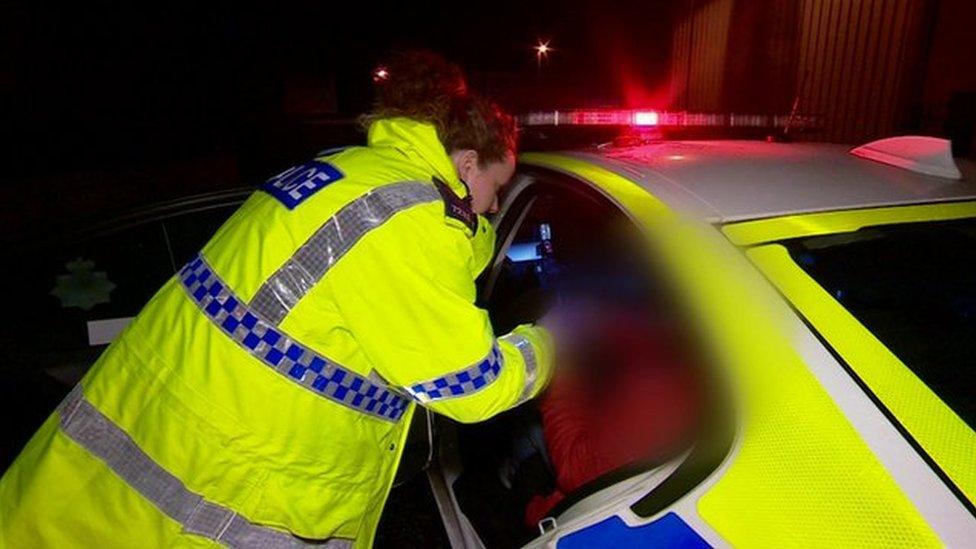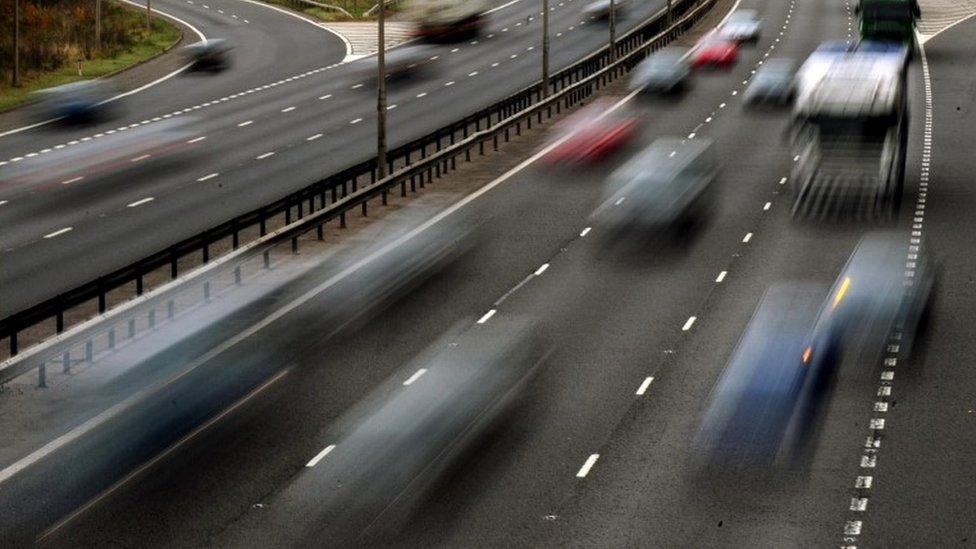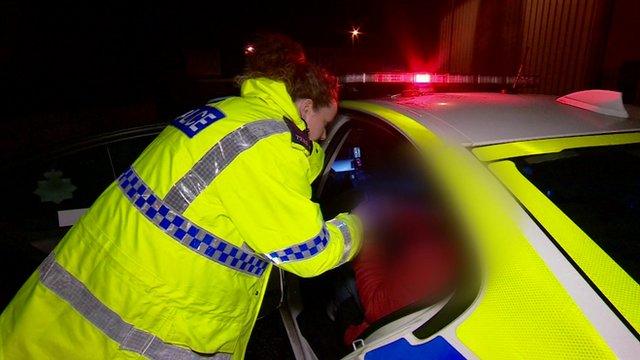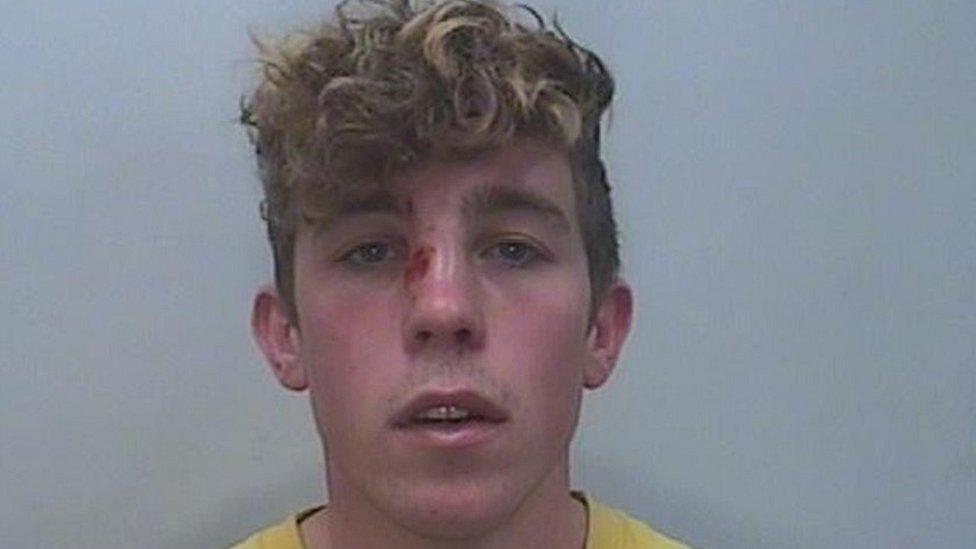Drug driving: Almost 8,000 arrests in England and Wales
- Published

There were almost 8,000 arrests last year for drug driving in England and Wales, figures obtained by BBC Radio 5 live show.
The statistics from 35 of the 43 forces showed that 7,796 people were arrested between March 2015 and April 2016.
New legislation, external was brought in covering legal driving limits for 17 illegal and prescription drugs in March last year.
Under the old laws, police had to show driving was impaired by drugs to prosecute.
In March 2015, new drug driving laws in England and Wales made it a specific offence to drive after having certain drugs above prescribed levels.
Those caught face a minimum 12-month driving ban, up to six months in prison, an unlimited fine and a criminal record.
The Metropolitan Police made the most arrests from March 2015 to April this year with 1,636, followed by Greater Manchester Police with 573 and Cheshire with 561.

'50-foot animals on the motorway'
A former drug user explains how drugs affected his driving capabilities in the past.
Bill, 31, spent almost 10 years abusing cocaine and other drugs.
"I drove a car for many years and took cocaine... I didn't have a car for a long period of time, I ran out of money, and then I used to steal my sister's car, or parents' car, often to go in search of more drugs," he said.
"I'm incredibly lucky to have never been involved in an accident.
"Quite often if I had mixed drugs... I would sort of temporarily black out, lose consciousness and come to and I'd be on the motorway and suddenly wake up and realise where I was.
"That's happened on a few occasions. Obviously I couldn't drive at all. I mean it was very dangerous, very selfish, very reckless. It's one thing I'm eternally ashamed about."
Mark, from Essex, uses his van for work and says he has been using cannabis "all day long" for 20 years while driving and is no danger at all.
He says the law has gone too far and police should only stop and test drivers if they have reason to do so.
"I've seen 50-foot high animals on the motorway but I knew it wasn't real and got home safe anyway," he says.
"It's wrong to get prosecuted for having drugs in your system. I may have 'wrong' blood levels but I can still be driving safely.
"I should only be arrested if my driving is impaired. The law did need changing. But this is too dramatic."

The change in the law covered eight illegal drugs including cannabis and cocaine, and nine prescription drugs including Temazepam and morphine.
People are not penalised if they use prescription drugs within recommended amounts, but they must doctors' advice - including if that advice is not to drive while taking certain substances.
A study published by the Department for Transport and seen by BBC Radio 5 live suggests 25% of young drivers know someone who has driven after smoking cannabis, and 11% know someone who has driven after taking Class A drugs.
Sedatives and stimulants
Athol Johnston, a professor of clinical pharmacology at Queen Mary University of London, was on the panel that advised the Department for Transport on drug driving limits.
"Of the 17 drugs on the list, over half of them are actually sedatives so they'll have a very similar action to alcohol, they'll make it more difficult for you to drive, you'll lack attention," he said.
"Then you've got the stimulants, they'll really distract you from driving, you're not paying attention, you don't drive as well.
"Then you've got things like Ketamine and LSD, which frankly, if you take those, you don't know what you're doing, because you're hallucinating, you may see things that aren't there, and you won't be able to control your car properly."

Prescription drugs covered by the new law
Amphetamines (eg dexamphetamine or selegiline) are used for conditions including attention-deficit disorders
Clonazepam is prescribed to treat seizures or panic disorders
Diazepam is used for anxiety disorders, alcohol withdrawal symptoms or muscle spasms
Flunitrazepam (also known as Rohypnol) is a sedative originally used in hospitals for deep sedation in the 1970s
Lorazepam is used to treat convulsions or seizures caused by epilepsy
Oxazepam is used to relieve anxiety, including anxiety caused by alcohol withdrawal
Temazepam affects chemicals in the brain that may become unbalanced and cause insomnia problems
Methadone is used in the treatment of heroin addiction and for pain relief
Morphine or opiates treat moderate to severe pain

At the same time as the law changes in England and Wales, forces were issued with roadside drug testing kits allowing them to check if a person had taken cocaine or cannabis.
The testing kit uses a mouth swab to check for the presence of drugs and a blue line appears after eight minutes if the person has taken them.
It only works for cocaine and cannabis. Drivers have to be taken to a police station for a blood test for other drugs.
The kits are not used by either Police Scotland or the Police Service of Northern Ireland, where separate legislation is in force.
In both countries, offenders are prosecuted under legislation making it an offence to drive while impaired by drink or drugs.

'Drugs are lethal'
Rachel Weston's brother Michael died in a car crash when he and the driver were both under the influence of drugs
Kat Weston's 21-year-old son Michael Owen died in April 2015 in Sussex, after a speeding car driven by his friend hit a wall. The pair had taken both prescribed and illegal drugs.
She said: "People don't realise the effect drugs have on them when they're driving. These drugs are lethal, and they've been banned for a reason.
"That night, Michael was seven times over the prescribed limit of sleeping tablets, they found cannabis in his system, no alcohol. They obviously felt invincible."
She said she did not know sleeping pills "were a thing kids took" until her son's death.
"I didn't realise they were taking, between them, sleeping pills in such a mass amount. They could have died from taking the overdose.
"This law is a good idea. If it stops 8,000 people from killing themselves, I welcome it.
"People that like to drug and drive, please consider what can happen to you. And to innocent people you could kill."

Figures provided by some forces show the impact the new test is having.
South Yorkshire Police drug driving-related arrests went from 13 in the year until the test was introduced to 456 the following year - a 3,400% increase, according to a BBC Yorkshire Freedom of Information (FOI) request.
Gloucestershire Chief Constable Suzette Davenport, the roads policing lead for the National Police Chiefs' Council, said: "The drug testing kit and the legislation are immensely helpful and have provided the operational officer with the tools necessary to help catch those who take the risk of drug driving."

Have you been affected by the issues in this story? You can share your experiences by emailing haveyoursay@bbc.co.uk, external.
Please include a contact number if you are willing to speak to a BBC journalist. You can also contact us in the following ways:
Whatsapp: +44 7525 900971
Send pictures/video to yourpics@bbc.co.uk, external
Tweet: @BBC_HaveYourSay, external
Send an SMS or MMS to +44 7624 800 100
- Published28 February 2016

- Published23 November 2015

- Published15 April 2016
